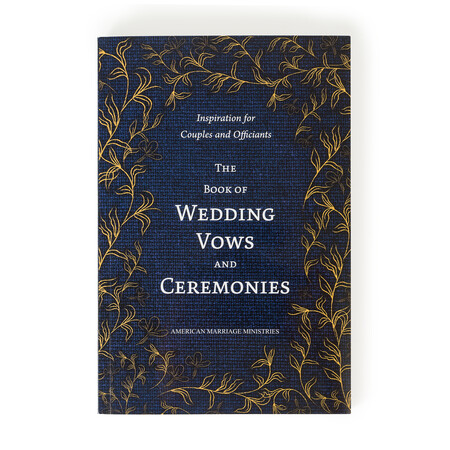Who can Solemnize Marriage in Iowa
The law(s) below are the relevant statutes relating to who can solemnize marriage and officiant registration in Iowa (where applicable).
§ 595.10Who May Solemnize
Marriages may be solemnized by:
1. A judge of the supreme court, court of appeals, or district court, including a district associate judge, associate juvenile judge, or a judicial magistrate, and including a senior judge as defined in section 602.9202, subsection 3.
2. A person ordained or designated as a leader of the person’s religious faith.
83 Acts, ch 159, §1; 87 Acts, ch 115, §69; 95 Acts, ch 92, §3
TAGS
solemnization of marriage
View Law
List of All 22 Iowa Marriage Laws
Below you can read through our curated list of all Iowa laws related to marriage, weddings, officiants, and marriage licenses. If it is in any way marriage related, you will find it here.
As used in this chapter, unless the context otherwise requires, “book”, “list”, “record”, or “schedule” kept by a county auditor, assessor, treasurer, recorder, sheriff, or other county officer means the county system as defined in section 445.1.
2000 Acts, ch 1148, §1
View Law
Marriage is a civil contract, requiring the consent of the parties capable of entering into other contracts, except as herein otherwise declared.
C2001, §595.1A
View Law
§ 595.3AApplication Form And License — Abuse Prevention Language.
In addition to any other information contained in an application form for a marriage license and a marriage license, the application form and license shall contain the following statement in bold print:
The laws of this state affirm your right to enter into this marriage and at the same time to live within the marriage under the full protection of the laws of this state with regard to violence and abuse. Neither of you is the property of the other. Assault, sexual abuse, and willful injury of a spouse or other family member are violations of the laws of this state and are punishable by the state.
97 Acts, ch 175, §233
View Law
§ 595.13Certificate — Return
After the marriage has been solemnized, the officiating minister or magistrate shall attest to the marriage on the blank provided for that purpose and return the certificate of marriage within fifteen days to the county registrar who issued the marriage license.
95 Acts, ch 124, §19, 26; 2000 Acts, ch 1140, §44; 2002 Acts, ch 1119, §189
View Law
Previous to the solemnization of any marriage, a license for that purpose must be obtained from the county registrar. The license must not be granted in any case:
1. Where either party is under the age necessary to render the marriage valid.
2. Where either party is under eighteen years of age, unless the marriage is approved by
a judge of the district court as provided by section 595.2.
3. Where either party is disqualified from making any civil contract.
4. Where the parties are within the degrees of consanguinity or affinity in which marriages
are prohibited by law.
5. Where either party is a ward under a guardianship and the court has made a finding that the ward lacks the capacity to contract a valid marriage.
91 Acts, ch 93, §2; 95 Acts, ch 124, §13, 26; 98 Acts, ch 1099, §2
View Law
§ 595.6Filing And Record Required
The affidavit or certificate, in each case, shall be filed by the county registrar and constitute a part of the records of the registrar’s office. A memorandum of the affidavit or certificate shall also be entered in the license book.
85 Acts, ch 67, §55; 95 Acts, ch 124, §16, 26
View Law
§ 595.7Delivery Of Blank With License
When a license is issued the county registrar shall deliver to the applicant a blank return for the marriage, and give instructions relative to the blank return as will insure a complete and accurate return.
95 Acts, ch 124, §17, 26
View Law
If a marriage is solemnized without procuring a license, the parties married, and all persons aiding them, are guilty of a simple misdemeanor.
View Law
§ 595.11Nonstatutory Solemnization — Forfeiture
Marriages solemnized, with the consent of parties, in any manner other than that prescribed in this chapter, are valid; but the parties, and all persons aiding or abetting them, shall pay to the treasurer of state for deposit in the general fund of the state the sum of fifty dollars each; but this shall not apply to the person conducting the marriage ceremony, if within fifteen days after the ceremony is conducted, the person makes the required return to the county registrar.
83 Acts, ch 185, §54, 62; 95 Acts, ch 124, §18, 26
View Law
§ 595.15Inadequate Return
If the return of a marriage is not complete in every particular as required by the forms specified in section 144.12, the county registrar shall require the person making the same to supply the omitted information.
95 Acts, ch 124, §20, 26
View Law
§ 595.16AIssuance Of Certified Copy Of Certificate Of Marriage
Following receipt of the original certificate of marriage pursuant to section 144.36, the county registrar shall issue a certified copy of the original certificate of marriage to the parties to the marriage.
2000 Acts, ch 1140, §45, 49
View Law
The provisions of this chapter, as they relate to procuring licenses and to the solemnizing of marriages are not applicable to members of a denomination having an unusual mode of entering the marriage relation.
82 Acts, ch 1152, §2
View Law
§ 595.18Issue Legitimatized
Children born outside of a marriage become legitimate by the subsequent marriage of their parents. Children born of a marriage contracted in violation of section 595.3 or 595.19 are legitimate.
94 Acts, ch 1046, §30
View Law
§ 595.20Foreign Marriages — Validity
A marriage which is solemnized in any other state, territory, country, or any foreign jurisdiction which is valid in that state, territory, country, or other foreign jurisdiction, is valid in this state if the parties meet the requirements for validity pursuant to section 595.2, subsection 1, and if the marriage would not otherwise be declared void.
98 Acts, ch 1099, §3
View Law
§ 144.36Marriage Certificate Filed — Prohibited Information
1. A certificate recording each marriage performed in this state shall be filed with the state
registrar. The county registrar shall prepare the certificate on the form furnished by the state
registrar upon the basis of information obtained from the parties to be married, who shall
attest to the information by their signatures. The county registrar in each county shall keep
a record of marriage certificates as required by the state registrar.
2. Every person who performs a marriage shall certify the fact of marriage and return the
certificate to the county registrar within fifteen days after the ceremony. The certificate shall
be signed by the witnesses to the ceremony and the person performing the ceremony.
3. The certificate of marriage shall not contain information concerning the race of the
married persons, previous marriages of the married persons, or the educational level of the
married persons.
4. The county registrar shall record and forward to the state registrar on or before the
tenth day of each calendar month the original certificates of marriages filed with the county
registrar during the preceding calendar month and the fees collected by the county registrar
on behalf of the state for applications for a license to marry in accordance with section
331.605, subsection 1, paragraph “g”.
[C24, 27, 31, 35, 39, §2421, 2422, 2425; C46, 50, 54, 58, 62, 66, §144.36, 144.37, 144.40; C71, 73, 75, 77, 79, 81, §144.36] 83 Acts, ch 186, §10048, 10201; 85 Acts, ch 195, §18; 95 Acts, ch 124, §6, 26; 99 Acts, ch 114, §6; 2010 Acts, ch 1061, §163; 2023 Acts, ch 19, §255
View Law
§ 595.5Name Change Adopted
1. A party may indicate on the application for a marriage license the adoption of a name change. The names used on the marriage license shall become the legal names of the parties to the marriage. The marriage license shall contain a statement that when a name change is requested and affixed to the marriage license, the new name is the legal name of the requesting party.
2. An individual shall have only one legal name at any one time.
88 Acts, ch 1142, §1; 95 Acts, ch 124, §15, 26; 99 Acts, ch 150, §1; 2001 Acts, ch 143, §7
View Law
1. A judge or magistrate authorized to solemnize a marriage under section 595.10, subsection 1, may charge a reasonable fee for officiating and making return for each marriage solemnized at a time other than regular judicial working hours. In addition the judge or magistrate may charge the parties to the marriage for expenses incurred in solemnizing the marriage. No judge or magistrate shall make any charge for solemnizing a marriage during regular judicial working hours. The supreme court shall adopt rules prescribing the maximum fee and expenses that the judge or magistrate may charge.
2. A minister authorized to solemnize a marriage under section 595.10, subsection 2, may charge a reasonable fee for each marriage solemnization and making return in an amount agreed to by the parties.
83 Acts, ch 151, §1
View Law
1. Marriages between the following persons who are related by blood are void:
a. Between a man and his father’s sister, mother’s sister, daughter, sister, son’s daughter, daughter’s daughter, brother’s daughter, or sister’s daughter.
b. Between a woman and her father’s brother, mother’s brother, son, brother, son’s son, daughter’s son, brother’s son, or sister’s son.
c. Between first cousins.
2. Marriages between persons either of whom has a husband or wife living are void, but, if the parties live and cohabit together after the death or divorce of the former husband or wife, such marriage shall be valid.
85 Acts, ch 99, §8; 94 Acts, ch 1023, §117
View Law
1. Only a marriage between a male and a female is valid.
2. Additionally, a marriage between a male and a female is valid only if each is eighteen
years of age or older. However, if either or both of the parties have not attained that age, the marriage may be valid under the circumstances prescribed in this section.
3. If either party to a marriage falsely represents the party’s self to be eighteen years of age or older at or before the time the marriage is solemnized, the marriage is valid unless the person who falsely represented their age chooses to void the marriage by making their true age known and verified by a birth certificate or other legal evidence of age in an annulment proceeding initiated at any time before the person reaches their eighteenth birthday. A child born of a marriage voided under this subsection is legitimate.
4. A marriage license may be issued to a male and a female either or both of whom are sixteen or seventeen years of age if both of the following apply:
a. The parents of the underage party or parties certify in writing that they consent to the marriage. If one of the parents of any underage party to a proposed marriage is dead or incompetent the certificate may be executed by the other parent, if both parents are dead or incompetent the guardian of the underage party may execute the certificate, and if the parents are divorced the parent having legal custody may execute the certificate; and
b. The certificate of consent of the parents, parent, or guardian is approved by a judge of the district court or, if both parents of any underage party to a proposed marriage are dead, incompetent, or cannot be located and the party has no guardian, the proposed marriage is approved by a judge of the district court. A judge shall grant approval under this subsection only if the judge finds the underage party or parties capable of assuming the responsibilities of marriage and that the marriage will serve the best interest of the underage party or parties. Pregnancy alone does not establish that the proposed marriage is in the best interest of the underage party or parties, however, if pregnancy is involved the court records which pertain to the fact that the female is pregnant shall be sealed and available only to the parties to the marriage or proposed marriage or to any interested party securing an order of the court.
5. If a parent or guardian withholds consent, the judge upon application of a party to a proposed marriage shall determine if the consent has been unreasonably withheld. If the judge so finds, the judge shall proceed to review the application under subsection 4, paragraph “b”.
85 Acts, ch 67, §53; 98 Acts, ch 1099, §1; 99 Acts, ch 114, §44
View Law
§ 595.16Spouse Responsible For Return
When a marriage is consummated without the services of a cleric or magistrate, the required return of the marriage may be made to the county registrar by either spouse.
95 Acts, ch 124, §21, 26
View Law
§ 595.4Age And Qualification — Verified Application — Waiting Period — Exception.
1. Previous to the issuance of any license to marry, the parties desiring the license shall sign and file a verified application with the county registrar which application either may be mailed to the parties at their request or may be signed by them at the office of the county registrar in the county in which the license is to be issued. The application shall include the social security number of each applicant and shall set forth at least one affidavit of some competent and disinterested person stating the facts as to age and qualification of the parties. Upon the filing of the application for a license to marry, the county registrar shall file the application in a record kept for that purpose and shall take all necessary steps to ensure the confidentiality of the social security number of each applicant. All information included on an application may be provided as mutually agreed upon by the division of records and statistics and the child support recovery unit, including by automated exchange.
2. Upon receipt of a verified application, the county registrar may issue the license which shall not become valid until the expiration of three days after the date of issuance of the license. If the license has not been issued within six months from the date of the application, the application is void.
3. A license to marry may be validated prior to the expiration of three days from the date of issuance of the license in cases of emergency or extraordinary circumstances. An order authorizing the validation of a license may be granted by a judge of the district court under conditions of emergency or extraordinary circumstances upon application of the parties filed with the county registrar. No order may be granted unless the parties have filed an application for a marriage license in a county within the judicial district. An application for an order shall be made on forms furnished by the county registrar at the same time the application for the license to marry is made. After examining the application for the marriage license and issuing the license, the county registrar shall refer the parties to a judge of the district court for action on the application for an order authorizing the validation of a marriage license prior to expiration of three days from the date of issuance of the license. The judge shall, if satisfied as to the existence of an emergency or extraordinary circumstances, grant an order authorizing the validation of a license to marry prior to the expiration of three days from the date of issuance of the license to marry. The county registrar shall validate a license to marry upon presentation by the parties of the order authorizing a license to be validated. A fee of five dollars shall be paid to the county registrar at the time the application for the order is made, which fee is in addition to the fee prescribed by law for the issuance of a marriage license.
85 Acts, ch 67, §54; 91 Acts, ch 116, §5; 95 Acts, ch 124, §14, 26; 97 Acts, ch 175, §234; 98 Acts, ch 1020, §3; 2018 Acts, ch 1041, §127
View Law
§ 595.10Who May Solemnize
Marriages may be solemnized by:
1. A judge of the supreme court, court of appeals, or district court, including a district associate judge, associate juvenile judge, or a judicial magistrate, and including a senior judge as defined in section 602.9202, subsection 3.
2. A person ordained or designated as a leader of the person’s religious faith.
83 Acts, ch 159, §1; 87 Acts, ch 115, §69; 95 Acts, ch 92, §3
TAGS
solemnization of marriage
View Law







